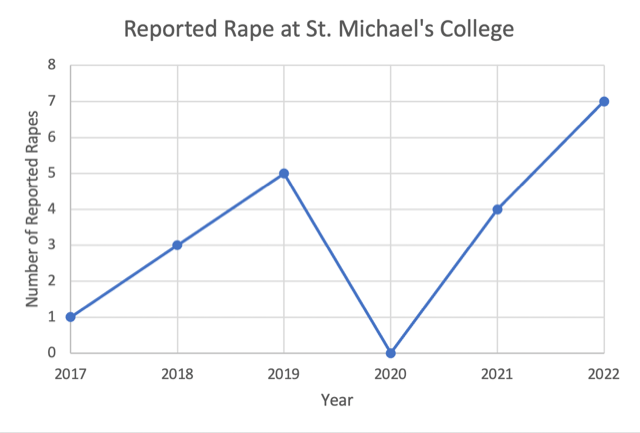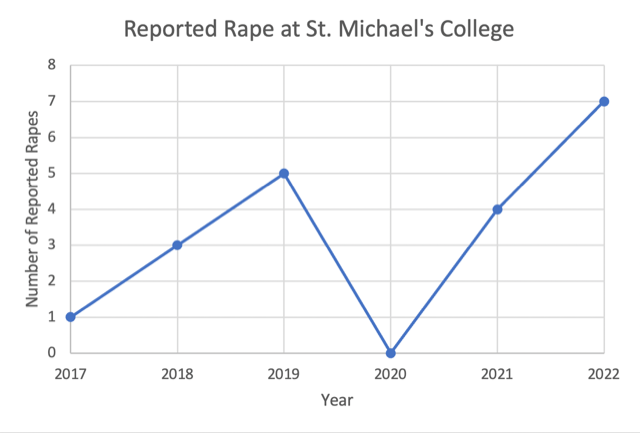
Izzy Quam/equam@mail.smcvt.edu/New & Feature Editor
There were seven reports of rape in 2022 according to the annual safety report released by St. Michael’s College public safety in September.
Although two of those cases were from the 1960s and were reported last year, the number sparked conversations about sexual violence, the on-campus resources for victims, and the role of sexual violence education at St. Michael’s College.
“It was really upsetting and shocking to see that number, but at the same time, sadly it’s not shocking because it is prevalent not just on our campus but in our community,” said Allie Petrozzo ’24 an employee for the Center for Women and Gender, in response to the report.
Title IX Coordinator Catherine Welch said that nationally one in five college women will experience sexual assault at some point in their college career.
“We know that if a student experiences sexual violence there are a lot of different paths forward for them, that doesn’t always include reporting,” explained Welch. “It is up to the student to decide what is the best path forward for them and that may be seeking counseling, it may be talking with an off-campus advocacy group, whatever it is, it is totally up to that student.”

“That’s a concerning amount that’s reported, but what wasn’t reported?” said Willow Morin, ’25, who is also an employee for the Center for Women and Gender.
According to Welch, the Office of Title IX and Sexual Misconduct handles formal reports of sexual violence. It provides counseling connections both on and off campus and can help arrange academic accommodations. Students may use the recourses without filing a report as well.
The Title IX Coordinator serves in a neutral role of support for St. Michael’s College community members.
Bergeron Wellness Center offers counseling for students who want to talk in a confidential space whether or not they file a report. It can also connect students to HOPE Works, a local center in Chittenden County that supports victims of sexual assault.
The Center for Women and Gender has a representative from HOPE Works on campus every Wednesday.
Although St. Michael’s College has many resources available, it is unclear how many students actually know about them. Cambelle Nutting ’24 said the only reason they know about the resources on campus is because of a Gender Studies class they took.
“A lot of people don’t know about the Center for Women and Gender and the resources we have to offer. This is a place where you can talk about this stuff and ask for change,” said Petrozzo.
Last year, Title IX & Sexual Misconduct recreated their posters to inform students of resources available. These posters are in all bathrooms on campus.
“In our culture, we do not talk about so many of the dimensions of sexual experiences,” said Kathy Butts, director of counseling at Bergeron Wellness Center.
Butts emphasized the need for education, and an increased effort by St. Michael’s College.
“Lots of information is missing from the sex education provided for our youth,” Butts said.
The challenge is finding a comprehensive way to reach the entire student body, Butts explained.
There is no required class that addresses it. The only students who have mandated sexual assault training are athletes.
“We do provide annual training that meets the NCAA requirement, and we always try to make it impactful…We want our programming to make a difference,” said Chris Kenny, director of Athletics.
Petrozzo said all students should be required to take a gender studies class.
“I think it should be part of the curriculum,” Petrozzo said. “And maybe something specifically focusing on sex education, sexual violence and sexual violence prevention.”
Currently, St. Michael’s College public safety officers are not required to participate in annual sexual assault training. Jeff Favreau, director of public safety, said it is difficult to find quality training for non- law enforcement officers.
“The options for these types of trainings are quite limited and vary greatly from year-to-year which makes it difficult to make this a required training for [public safety] officers annually,” said Favreau.
Favreau himself has been trained on trauma-informed victim interviewing. He said he is striving to have his officers receive more training in the future.
Morin is a resident assistant and said she received very little training on the topic of sexual violence. “We deal with people who have been sexually assaulted, and I don’t know what to do besides call someone else in,” Morin said.
The Catholic foundation of St. Michael’s College plays a role in the attitude toward sex education on campus. “The ministry has a lot of say on this campus,” said Morin.
For example, Bergeron is not permitted to provide condoms to students.
Father Michael Carter, campus minister and member of the Society of St. Edmund explained that if the school provided contraception, the Catholic title would likely be removed from the school.
Father Michael Carter said there are “hot button topics” in Catholicism, and contraception is one of them. If the school were to provide contraception, the Bishop of Burlington would be under pressure to remove the Catholic title from St. Michael’s College.
Petrozzo asked, “How can we promote sex education and prevention in our school? How can we make it easier for victims to feel comfortable coming forward and reporting? … And how can we change the norms under a society that has rape culture embedded in it?”
“We can’t get hopeless; we have to keep chipping away at it and doing something instead of nothing,” Butts said.

